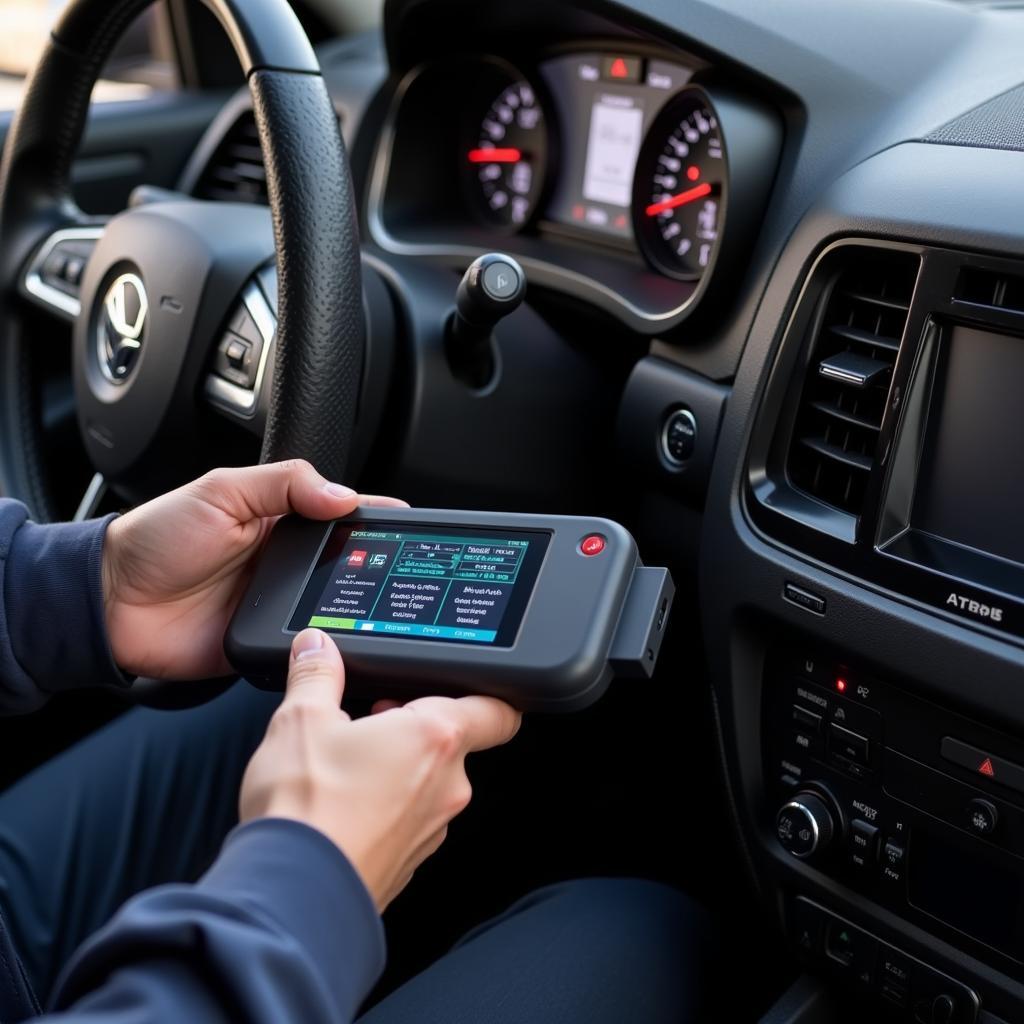Modern vehicles are technological marvels, but all that complexity can be daunting when something goes wrong. Instead of rushing to a mechanic for every dashboard light, a home car diagnostic kit empowers you to understand your car’s health in the comfort of your garage.
What is a Home Car Diagnostic Kit?
A home car diagnostic kit is a powerful tool that connects to your car’s onboard computer, allowing you to read and understand those cryptic diagnostic trouble codes (DTCs) that trigger the check engine light. But their capabilities often extend far beyond basic code reading.
Why Choose a Home Car Diagnostic Kit?
Imagine this: Your car starts sputtering, the check engine light flashes ominously, and you’re facing a hefty repair bill without understanding the problem. Home car diagnostic kits offer a solution by providing:
- Early Problem Detection: Identify minor issues before they escalate into major (and expensive) repairs.
- Cost Savings: Avoid unnecessary trips to the mechanic for simple diagnoses.
- Increased Knowledge: Understand your car better and make informed decisions about repairs.
- Enhanced Control: Take charge of your car’s maintenance and avoid potential upselling.
Types of Home Car Diagnostic Kits
There’s a home car diagnostic kit for every skill level and budget:
1. Code Readers:
These entry-level devices simply read and clear basic DTCs. They’re affordable and user-friendly, perfect for beginners.
2. OBD2 Scanners:
Offering a step up from code readers, OBD2 scanners provide more detailed information about DTCs, including freeze frame data and live sensor readings.
3. Bluetooth Scanners:
These versatile scanners connect wirelessly to your smartphone or tablet, allowing you to access a wealth of diagnostic data and advanced features through dedicated apps.
4. Professional-Grade Scanners:
Packed with advanced features like bi-directional control, programming capabilities, and access to manufacturer-specific codes, these scanners are ideal for experienced DIYers and professionals alike.
How to Choose the Right Home Car Diagnostic Kit
Selecting the ideal kit depends on your needs:
- Frequency of Use: For occasional check engine light diagnoses, a code reader or basic OBD2 scanner might suffice.
- Technical Expertise: If you’re comfortable with more advanced diagnostics or plan to tackle complex repairs, consider a Bluetooth or professional-grade scanner.
- Vehicle Compatibility: Ensure the kit is compatible with your car’s make, model, and year. OBD2 scanners are standard for vehicles manufactured after 1996.
- Budget: Prices range from affordable code readers to feature-rich professional-grade scanners.
Tips for Using a Home Car Diagnostic Kit
- Read the Manual: Familiarize yourself with the kit’s functions and capabilities.
- Locate Your OBD2 Port: Typically found under the dashboard on the driver’s side.
- Turn Off Your Engine: Connect the kit with the engine off to avoid potential damage.
- Interpret Codes Carefully: Use online resources or repair manuals to understand DTC meanings.
- Don’t Hesitate to Seek Help: For complex issues, consult a qualified mechanic.
Conclusion
Home car diagnostic kits are empowering tools for any car owner. By providing insights into your car’s health, these kits can save you time, money, and unnecessary headaches. Whether you’re a seasoned DIY mechanic or a car enthusiast looking to gain more control, a home car diagnostic kit is a valuable investment.
FAQs about Home Car Diagnostic Kits
1. Will a home car diagnostic kit work on my car?
Most cars manufactured after 1996 have a standard OBD2 port, making them compatible with most home car diagnostic kits. However, it’s always best to check the kit’s compatibility with your specific car make and model before purchasing.
2. Can I use a home car diagnostic kit to reset my check engine light?
Yes, most home car diagnostic kits allow you to clear DTCs and reset the check engine light. However, it’s crucial to address the underlying problem that triggered the light in the first place.
3. Do I need a professional-grade scanner for basic car maintenance?
No, a code reader or basic OBD2 scanner is sufficient for most basic car maintenance tasks, such as reading and clearing DTCs.
4. Are home car diagnostic kits difficult to use?
Not at all! Many home car diagnostic kits are designed with user-friendliness in mind. With a little guidance from the manual, you can easily navigate the menus and interpret the results.
5. Can I trust the information provided by a home car diagnostic kit?
While home car diagnostic kits are valuable tools, it’s essential to interpret the information carefully. Cross-referencing DTCs with reputable online resources or repair manuals can help ensure accuracy.
Need help with car diagnostics or want to learn more about our recommended diagnostic kits? Don’t hesitate to reach out! Contact our team of car diagnostic experts 24/7 via WhatsApp: +1(641)206-8880, or Email: cardiagtechworkshop@gmail.com. We’re here to help you get back on the road with confidence.


